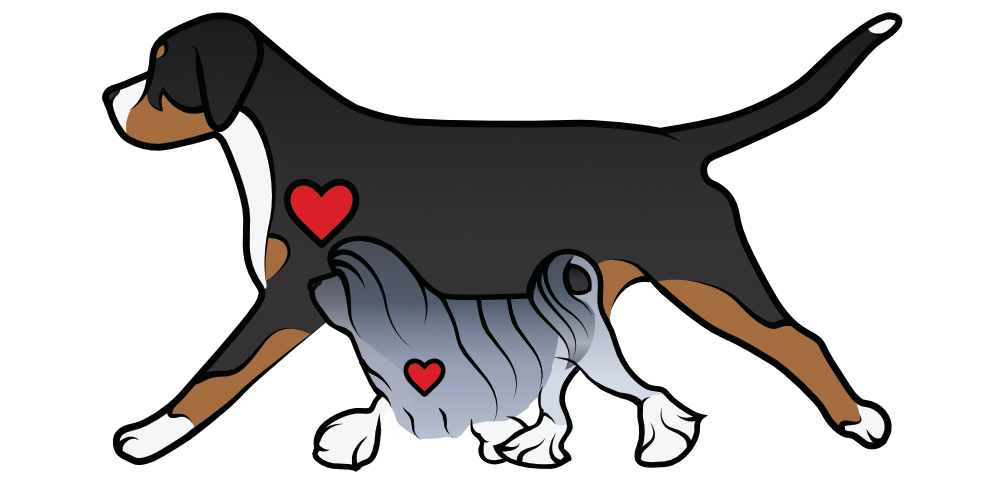The dog world can be pretty confusing with words that don’t appear in Websters or in Urban dictionaries. This can pose a problem when reading different websites or when communicating with breeders. Here’s some quick definitions to help you decipher some of the lingo. Please note that many of the terms will require putting them into context with the breed. For example: health testing differs by breed. In order to understand what health testing means for each breed, please visit the parent club page or the Canine Health Information for breed specific guidelines. *Not a comprehensive list of terms.
Health testing/tested – This term means performing the tests recommended by the breed’s parent club. The publisher of test results for the United States is OFA.org. Publicly shared results will appear on the OFA website if the owner has selected to submit them.
Vet checked – This is a term used to generically mean that they went to the vet. It is implied that the vet found the dog to be in adequate condition, but is it not clear whether or not any specific tests or exams were performed. This term is not interchangeable with health tested. Puppies are often referred to as vet checked as they are not old enough to perform in depth health testing. It is extremely difficult to predict many diseases in 8 week old puppies, and it is important to keep in mind that breeders cannot guarantee that a particular puppy will or will not develop a health issue down the road.
With papers – It is very rare for people in AKC dog sports to use the term as the dogs must be registered in order to compete. While, there may be no questions about whether or not a dog that is competing has papers, you’ll still want to ask if the puppy you are buying is registered. You can also ask if you will be getting full registration or limited registration. Many breeders have moved to online registration so there aren’t really any “papers” that homes get at pick up. Those will come to you in the mail at a later date. This term might still be used to imply that the dog or puppy is registered, and you’ll want to ask if those papers are from the American Kennel Club or other registries.
Champion lines – This implies that there are AKC champion dogs somewhere in the pedigree. There are other types of venues that award champion titles other than AKC. Puppy buyers should ask for specifics on the champion titles. How many champions and how distantly related are questions the buyer should also ask. *Champion lines does not imply any guarantee about the individual puppy you might be purchasing. Read here for how to look up AKC show results for a particular dog.
DNA tested but now often referred to as Embarked – Though this is a brand name, it has become a term to mean that dog’s DNA tested for the currently available genetic markers. There are multiple companies who offer canine DNA testing such as UCDavis, Paw Print Genetics, Wisdom Panel, and university labs. DNA Testing is not a replacement for health testing, though using DNA testing may be a way to complete some breed specific health tests. It is advised to study each breed carefully as 1. Some breeds do not have any health conditions that currently have any genetic markers. 2. Some breeds have identified DNA markers that do not mean anything. 3. DNA markers are not comprehensive tests for all known diseases. 4. DNA marker results are not indicative disease. Simply because a dog might be genetically affected, it may not ever actually have the disease.
*Embarked Clear – without context of the breed, this simply means that the dog was tested to not have the genetic markers it was tested for. Without understanding the breed and which tests were performed, this does not give buyers any actionable information nor is this a signal that the breeder is making breeding decisions based on health.
Coefficient of inbreeding (COI) – Going deep into this topic will take many pages of text. At the surface, this is a number that estimates the amount of duplicative genes in a dog – which most people call inbreeding. This can be assessed through DNA testing or through pedigree analysis. Incorrect application of this COI has recently been popularized through false information on social media. What should be a topic of conversations among breeders is genetic diversity at the population level, not COI. Health tested parents and extended family should carry more weight in your puppy buying decisions than COI. Here’s some interesting information about human COI at 17:13. *Other important factors to consider when purchasing your puppy is how your breeder may handle problems that come up, genetic temperament of the parents, how the puppies were raised, and if the puppy’s temperament matches your home’s needs.
Cobreeder or co-owner – These types of relationships exist for a variety of reasons. Sometimes individuals may choose to co-own a dog in order to share the financial costs of campaigning a show dog. Sometimes breeders work very closely together that they share the decision making aspects, whelping aspects, or puppy raising aspects of their programs. Some people co-own dogs for the purposes of entering Owner-Handled competitions that requires AKC ownership for the handler. There isn’t a single definition of these relationships, and it is always wise to carefully read through written contracts outlining these relationships.
